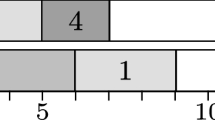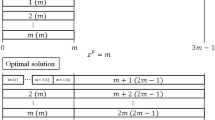Abstract
We study scheduling problems with controllable processing times on parallel machines. Our objectives are to maximize the weighted number of jobs that are completed exactly at their due date and to minimize the total resource allocation cost. We consider four different models for treating the two criteria. We prove that three of these problems are \(\mathcal{NP}\) -hard even on a single machine, but somewhat surprisingly, the problem of maximizing an integrated objective function can be solved in polynomial time even for the general case of a fixed number of unrelated parallel machines. For the three \(\mathcal{NP}\) -hard versions of the problem, with a fixed number of machines and a discrete resource type, we provide a pseudo-polynomial time optimization algorithm, which is converted to a fully polynomial time approximation scheme.
Similar content being viewed by others
References
Ahuja RK, Magnanti TL, Orlin JB (1993) Network flows—theory, algorithms and applications. Englewood Cliffs, Prentice-Hall
Alidaee B, Ahmadian A (1993) Two parallel machine sequencing problems involving controllable job processing times. Eur J Oper Res 70:335–341
Arkin EM, Silverberg EL (1987) Scheduling jobs with fixed start and finish times. Discrete Appl Math 18:1–8
Armstrong R, Gu S, Lei L (1995) An algorithm for the two-resource allocation problem with a non-differentiable convex objective function. J Oper Res Soc 46:116–122
Armstrong R, Gu S, Lei L (1997) Solving a class of two-resource allocation problems by equivalent load method. J Oper Res Soc 48:818–825
Baker KR, Scudder GD (1990) Sequencing with earliness and tardiness penalties: a review. Oper Res 38:22–36
Bouzina KI, Emmons H (1996) Interval scheduling on identical machines. J Glob Optim 9:379–393
Carlisle MC, Lloyd EL (1995) On the k-coloring of intervals. Discrete Appl Math 59:225–235
Cheng TCE, Janiak A, Kovalyov MY (1998) Bicriterion single machine scheduling with resource dependent processing times. SIAM J Optim 8(2):617–630
Čepek O, Sung SC (2005) A quadratic time algorithm to maximize the number of just-in-time jobs on identical parallel machines. Comput Oper Res 32:3265–3271
Cheng TCE, Oğuz C, Qi XD (1996) Due-date assignment and single machine scheduling with compressible processing times. Int J Prod Econ 43:29–35
Chudzik K, Janiak A, Lichtenstein M (2006) Scheduling problems with resource allocation. In: Janiak A (ed) Scheduling in computer and manufacturing systems. WKL, Warszawa
Frank A (1980) On chains and antichains families of a partially ordered set. J Combin Theory Ser B 29:176–184
Graham RL, Lawler EL, Lenstra JK, Rinnooy Kan AHG (1979) Optimization and approximation in deterministic sequencing and scheduling: a survey. Ann Discrete Math 5:287–326
Hiraishi K, Levner E, Vlach M (2002) Scheduling of parallel identical machines to maximize the weighted number of just-in-time jobs. Comput Oper Res 29(7):841–848
Hoogeveen H, Woeginger GJ (2002) Some comments on sequencing with controllable processing times. Computing 68:181–192
Hsiao JY, Tang CY, Chang RS (1992) An efficient algorithm for finding a maximum weight 2-independent set of interval graphs. Inf Process Lett 43:229–235
Janiak A (1987) One-machine scheduling with allocation of continuously-divisible resource and with no precedence constraints. Kybernetika 23(4):289–293
Janiak A (1988) General flow-shop scheduling with resource constraints. Int J Prod Res 26(6):1089–1102
Janiak A (1998) Minimization of the makespan in a two-machine problem under given resource constraints. Eur J Oper Res 107:325–337
Janiak A, Janiak W, Lichtenstein M (2007) Resource management in machine scheduling problems: a survey. Decis Making Manuf Serv 1:59–89
Janiak A, Kovalyov MY (1996) Single machine scheduling subject to deadlines and resource dependent processing times. Eur J Oper Res 94:284–291
Janiak A, Kovalyov MY, Kubiak W, Werner F (2005) Positive half-products and scheduling with controllable processing times. Eur J Oper Res 165:416–422
Janiak A, Portmann C (1998) Genetic algorithm for the permutation fow-shop scheduling problem with linear models of operation. Ann Oper Res 83:95–114
Janiak A, Szkodny T (1994) Job-shop scheduling with convex models of operations. Math Comput Model 20(2):59–68
Kaspi M, Shabtay D (2003) Optimization of machining economics problem for a multi-stage transfer machine under failure, opportunistic and integrated replacement strategies. Int J Prod Res 41(10):2229–2248
Kayan RK, Akturk MS (2005) A new bounding mechanism for the CNC machine scheduling problem with controllable processing times. Eur J Oper Res 167:624–643
Kovalyov MY, Ng CT, Cheng TCE (2007) Fixed interval scheduling: models, applications, computational complexity and algorithms. Eur J Oper Res 178:331–342
Lann A, Mosheiov G (1996) Single machine scheduling to minimize the number of early and tardy job. Comput Oper Res 23:765–781
Lee CY, Lei L (2001) Multiple-project scheduling with controllable project duration and hard resource constraint: some solvable cases. Ann Oper Res 102:287–307
Ng CTD, Cheng TCE, Janiak A, Kovalyov MY (2005) Group scheduling with controllable setup and processing times: minimizing total weighted completion time. Ann Oper Res 133:163–174
Monma CL, Schrijver A, Todd MJ, Wei VK (1990) Convex resource allocation problems on directed acyclic graphs: duality, complexity, special cases and extensions. Math Oper Res 15:736–748
Nowicki E, Zdrzalka S (1990) A survey of results for sequencing problems with controllable processing times. Discrete Appl Math 26:271–287
Pal M, Bhattacharjee GP (1996) A sequential algorithm for finding a maximum weight K-independent set on interval graphs. Int J Comput Math 60:205–214
Saha A, Pal M (2003) Maximum weight k-independent set problem on permutation graphs. Int J Comput Math 80:1477–1487
Sahni S (1976) Algorithms for scheduling independent tasks. J Assoc Comput Mach 23(1):116–127
Sarrafzadeh M, Lou RD (1993) Maximum k-covering of weighted transative graph with applications. Algorithmica 9:84–100
Scott SC, Jefferson TR (1995) Allocation of resources in project management. Int J Syst Sci 26(2):413–420
Shabtay D (2004) Single and a two-resource allocation algorithms for minimizing the maximal lateness in a single machine-scheduling problem. Comput Oper Res 31(8):1303–1315
Shabtay D, Kaspi M (2004) Minimizing the total weighted flow time in a single machine with controllable processing times. Comput Oper Res 31(13):2279–2289
Shabtay D, Kaspi M, Steiner G (2007) The no-wait two-machine flow-shop scheduling problem with convex resource-dependent processing times. IIE Trans 39(5):539–557
Shabtay D, Steiner G (2007) A survey of scheduling with controllable processing times. Discrete Appl Math 155(13):1643–1666
Shakhlevich NV, Strusevich VA (2005) Pre-emptive scheduling problems with controllable processing times. J Sched 8:233–253
Shakhlevich NV, Strusevich VA (2006) Single machine scheduling with controllable release and processing times. Discrete Appl Math 154:2178–2199
Steiner G (1992) Finding the largest suborder of fixed width. Order 9:357–360
Sung SC, Vlach M (2005) Maximizing weighted number of just-in-time jobs on unrelated parallel machines. J Sched 8:453–460
Trick M (1994) Scheduling multiple variable-speed machines. Oper Res 42:234–248
Van Wassenhove L, Baker KR (1982) A bicriterion approach to time/cost trade-offs in sequencing. Eur J Oper Res 11:48–54
Yannakakis M, Gavril F (1987) The maximum k-colorable subgraph problem for chordal graphs. Inf Process Lett 24:133–137
Yedidsion L, Shabtay D, Kaspi M (2007) A bicriteria approach to minimize maximal lateness and resource consumption for scheduling a single machine. J Sched 10(8):341–352
Author information
Authors and Affiliations
Corresponding author
Rights and permissions
About this article
Cite this article
Leyvand, Y., Shabtay, D., Steiner, G. et al. Just-in-time scheduling with controllable processing times on parallel machines. J Comb Optim 19, 347–368 (2010). https://doi.org/10.1007/s10878-009-9270-5
Published:
Issue Date:
DOI: https://doi.org/10.1007/s10878-009-9270-5




